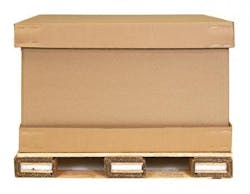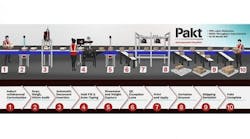Corrugated Crates Save on Shipping Costs
J-Crates are customized corrugated crating solutions that offer a bevy of benefits including reduced shipping costs, maximization of warehousing space, and increased sustainability.
The J-Crate concept is simple: rather than the typical all-wood crate typically used to transport large items, PACT’s solution comprises a wooden base surrounded by sturdy yet pliable corrugated material. The lightweight shipper saves on transport costs and, since it can collapse to be barely wider than the base wood component, takes up exponentially less space than standard crates. Moreover, many countries charge fees for disposing of conventional wooden crates upon item delivery; J-Crates eliminate this cost as the materials can be recycled, repurposed, and reused several times over.
Crucially, J-Crates do not sacrifice product protection. The corrugated containers have been proven to keep even the most fragile items secure during transport, as the structure can withstand 4,000 lb. of pressure (the same amount as a standard wooden pallet). In addition to the J-Crate’s inherent sturdiness, its corrugated material is a better shock absorber than wood, meaning J-Crates diminish the sort of vibration-related damage that can result from the jostles and jolts packages frequently endure throughout the supply chain.
Lean manufacturing is another consideration driving increased demand for J-Crates as companies look to reduce labor costs associated with crate construction – a factor addressed by the corrugated crate’s simple fold-out process that can be customized to the size and shape of individual products.





